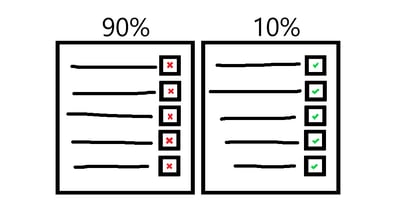Is procrastination an emotion, condition or behaviour? In any case I’ve found that you can...
3 Habits to Change to Stop Self-Sabotaging Yourself.

You know that task you need to do? Why haven't you done it yet? This is why...
If you are a human being, which is most likely true if you are reading this. Then you are a victim of self-sabotage. Unknowingly or intentionally often or not people tend to know what they need to do but fail to act upon it.
I’ve fallen into these traps more than I would like to admit but recognising the issue is the first step to remedying it.
So here are 3 habits that often trap people into believing they are making progress, when in reality they are not.
Planning
Planning is great simply because it doesn’t require actually doing anything. As a chronic procrastinator at times, I have realised that researching, and planning, while useful in its own right, has a way of drawing you in and never letting you go.
Planning and research can be so all consuming that you spend all your time figuring out where the whole staircase goes rather than just taking the first step and beginning the task.
Then discouraged at how hard the task will be, you don’t even start it.
So why does a seemingly capable person keep making the same mistake of putting forward such a poor attitude to their hustle again and again?
The answer lies in the approach towards effective planning.
The problem with most peoples methodology is that their research, planning and ideal goals are too vague and broad.
This leads to discouragement because the tasks are too daunting to solve.
I’ve found that the more specific you can get to create clear, actionable steps is the most effective way to make progress.
As simple as it sounds, the procrastinator in you is always screaming excuses at you which you often give into. So to ignore them if you can make the steps so easy they are almost laughable then your progress will compound overtime.
This concept of “Giggling Goals” is not a new one.
The specificity of your actions makes achieving these goals a lot easier.
Here’s an example of specific actions you could take if for example your goal was to develop your spanish:
These steps broken down make it a lot easier to manage. You can then multiply this once you get used to the habit.
Now in my opinion the goal of “learning spanish” is obviously way too vague to act on. But in a previous article you can learn about how to set better goals and make it easier to take action on them here.
Work vs Value
With your new found work ethic, another habit that people often get blindsided by is the one that being “busy” is the same as working hard.
While seemingly obvious, the mentality of hustling and grinding has been adopted by many.
The problem is that just because you are busy and working a lot, does not mean you are doing anything of value.
Work for work's sake isn't efficient.
The 80/20 Rule states that 20% of the work accounts for 80% of the value.
I.E 20% of what you input is going to account for 80% of the development.
The big challenge is figuring out what actions make up the 20%.
I find the simplest practice is to choose your primary focus.
Every task has a different priority, so it’s important to choose your most desired outcome.
Then being specific like in the previous section, what action can you implement to get a step closer to the primary outcome.
In the Spanish example, what are your priorities in terms of the conversations you want to have?
What is the desired outcome of speaking Spanish, is it fluency? Or is it just being able to order a couple beers and get the check?
In either case your primary focus will be slightly different in the approach you take to learning the language.
Chasing Shiny Projects
When exploring your opportunities, often you can get distracted easily.
New ideas always seem more compelling than old ones.
Especially if you answered your lingering questions in the research and planning phase.
Whatever your goals, the solution to distractions is a solid system of working.
Just like the specificity of your workflow for optimised value, staying focused on the next step in the staircase gives you the tunnel vision you need to progress.
Staying consistent will pay dividends. With compound interest.
The Bottom Line
Self-reflection is the first step toward progress. Ask yourself, if you really take a step back and reflect on your actions, are you really doing everything in your power to achieve your goals?
The biggest challenges are often internal, ignoring your inner voice is a skill that you can develop.
Your mind is the battlefield and you are the commander.
So will you go to war with yourself?
.png?width=200&height=200&name=DREW%20WYATT%20(5).png)


